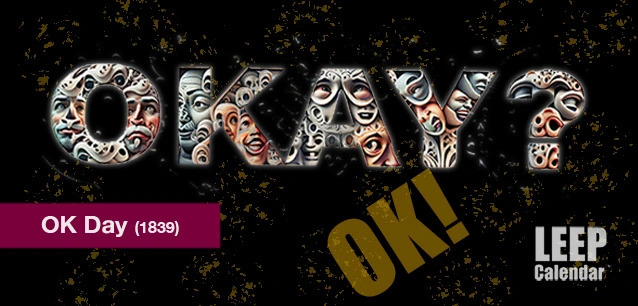 AD
AD
Today is: December 31
Scroll to explore events active on this date.
Additional Events on LEEP
LEEP INK FEATURES

August? Absolutely!
In August, we live through the Dog Days of Summer. It's hot and often humid, and those who can leave for better climates do. Down south, winter is in full force. August is also known as "the ...

In The Heat of July: July 2025 Events
Is it hot enough (or cold enough if you're below the equator) for you yet? There is actually a day for that! Like every month, I pick a diverse collection of events you may or may not know about. This ...

May Blooms: Events in May 2025
Along with October, May is one of the most densely packed months of the year. It's before the summer humidity and the last whole month of the school year. The weather is warming in t...
About OK Day
United States
Ends: Mar 23, 2024
DESCRIPTION:
"Okay," often abbreviated as "OK," is one of the most universally recognized and used words globally. Its journey from obscure to global acceptance touches upon linguistic evolution, cultural integration, and the nuances of non-verbal communication across different societies.
The etymology of "okay" first appeared on March 23, 1839, in the Boston Morning Herald as an editing abbreviation of "oll korrect," a deliberate misspelling of "all correct." This usage was part of a broader fad for playful abbreviations and misspellings. The term gained popularity and became cemented in American English during the 1840 presidential campaign of Martin Van Buren. His nickname, "Old Kinderhook," after his hometown in New York, was shortened by his supporters to "OK Club," which helped to popularize the term.
From its American origins, "okay" began spreading across the globe in the late 19th and early 20th centuries, facilitated by the expansion of American influence and the rise of English as a global lingua franca. Its simplicity, versatility, and ease of pronunciation made it an attractive addition to other languages, often retaining its positive affirmation meaning. Today, "okay" is understood and used in nearly every prominent language, serving as a testament to its remarkable adaptability and universal appeal.
However, the word's journey has not been without controversy, particularly regarding the associated "OK" hand gesture, where the thumb and forefinger form a circle while the other fingers remain extended. This gesture, widely recognized as a symbol for "okay" or "all is well," has different meanings and interpretations worldwide.
In some cultures, it is a positive sign of agreement or satisfaction. In others, like Brazil, it means "asshole" and can have offensive connotations or be considered a vulgar gesture. Furthermore, with the rise of MAGA and Christian nationalism in North America, the "OK" hand sign has been co-opted by white supremacists as a symbol of hate, leading to a reevaluation of its use and meaning. The three fingers lifted or pointed down symbolize KKK in their circles, the abbreviation of the hate group Ku Klux Klan. Because of this, the use of the gesture is diminishing.
Today, learn more about the history behind the word OK or call a loved one, a friend, or a family member you haven't heard from in a while and ask them if they are OK.
"Okay" and its associated gestures underscore the dynamic nature of language and communication. They reflect how words and symbols can transcend cultural and linguistic boundaries and the complexities inherent in their interpretation.
VIDEOS
SUPPORTING DOCUMENTS
Currently, this event does not have supporting documents.
ADDITIONAL IMAGES
Currently, this event does not have supporting images.
Where would you like to go now?
 AD
AD


/footer-logo.svg)
